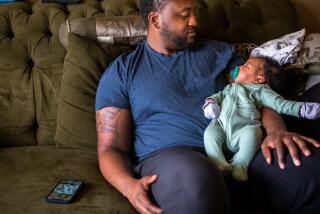What Parents Can Do to Help Kids Learn : Education: Even more important than the three Rs, educators say, are the four Cs: care, confidence, competence and control.
- Share via
NEW YORK — Self-esteem is important in a child’s development, says educator Anne Wescott Dodd, and parents and schools must work together to foster this “pride in oneself.”
One way to think about this process, Dodd said, is in terms of the four Cs: care, confidence, competence and control. An increase in any one of the four Cs tends to raise the others.
“To foster real self-esteem, teachers must create classroom environments where all children feel they are valued and provided with enough support and encouragement to be successful,” said Dodd, author of “A Parent’s Guide to Innovative Education.”
This means children are not grouped by ability; that children learn through cooperation and collaboration; and that mistakes are a learning experience, said Dodd, a teacher at Bates College and the University of Maine, at a recent panel discussion sponsored by Child magazine.
Dodd urged parents to become involved with their children’s schools; to work with their children and their teachers. She also encouraged parents to:
* Love their children and show how much they love them.
* Read, write and talk to their children.
* Love learning, which, in turn, encourages children to love learning.
“If your children feel cared for, capable and confident, they’ll also have a sense that they have some control over what happens to them,” she said. “They’ll be able to confront the routine challenges of life rather than be overwhelmed or paralyzed by them.”
Also appearing on the panel: Charles E. Schaefer, professor of psychology at Farleigh Dickinson University in New Jersey, and Edward Teyber, professor of psychology at California State San Bernardino.
The three panelists answered questions from parents and professionals about education, infant sleep problems and divorce.
Teyber, a child-clinical psychologist, said parents in the midst of a divorce must shield their children from parental conflict as much as possible.
Parents need to establish custody and visitation rights. Fathers must stay involved in family life. And children have to be informed of what is going to happen as a result of the divorce, he said.
“Divorce is an adult decision,” said Teyber, author of “Helping Children Cope with Divorce.” “It’s permanent.”
Schaefer said “new parents” fall into predictable “stress traps,” including “putting the baby to sleep” by patting or rocking, overreacting to infant crying and neglecting the marital relationship.
Three-week-old babies can fall asleep on their own, without their parents’ help, he said. Babies who are allowed to fall asleep by themselves will be able to go back to sleep by themselves when they awaken during the night. And babies, like adults, awaken three or four times a night.
As for infant crying, Schaefer said the normal 2-week-old infant cries two hours a day, while at 6 weeks, the same child cries three hours a day, most typically in late afternoon and early evening.
This is a normal “fussy” period, he said, and if the child’s basic needs have been met, there is no harm in letting him or her cry for brief periods to release tension.
Finally, Schaefer said, it is natural to be totally absorbed by a newborn, but parents need to keep their marriage strong. Couples must set aside some “adult-only” time for themselves, he said.
Schaefer is director of Farleigh Dickinson’s Crying Baby Clinic. He is the author of more than 20 books, including “Raising Baby Right,” with Teresa Foy DiGeronimo.
Child magazine recently selected Dodd, Teyber and Schaefer’s books in its list of “The 10 Best Parenting Books of 1992.”






